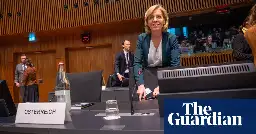
Europe
- Submit your images for the banner picture of c/europe
Keeping up with the tradition, please submit banner pictures here.
I look forward to your submissions 😊
The Rules
- Picture must be made on the European continent;
- You must adhere to the local laws in your country and the German ones as well (since Feddit.de is hosted there);
- Only real photos, no AI generated pictures;
- You must have took the picture and have all rights to it, or it needs to have a licence where usage is possible (e.g. Creative Commons), please indicate it accordingly;
- No personal identifiable data in the picture. Please blur any licence plates or faces (except when it’s a mass gathering of people e.g. a Christmas market, and the picture shows the Christmas market and not singles out a single person);
- Please provide a short description where the image was taken and what it shows.
- c/europe is looking for mods
Hello!
Unfortunately, the previous moderator of c/europe has deleted their account a while ago, leaving c/europe largely unmoderated. We are now looking for someone to take over as moderator for this community.
As c/europe is one of the largest and most active communities on feddit.de, we would like to finde someone who is interested in ensuring that it is properly moderated. If you are interested in taking on this role, please let us know! The purpose of this role is to oversee discussions and prevent the spread of spam and misinformation (though I can assure you that the users in this community are generally polite). You can count on receiving support in resolving reports from the instance admins too, so you are not left alone with this task.
Ideally we are looking for users that are already active in this community, have a calm mind and follow "European values".
If you're interested, please don't hesitate to leave a comment or send a direct message.
___
Finally, we would like to thank the previous moderator of this community, albert180, for your efforts and wish you all the best!
___
EDIT: @poVoq@slrpnk.net will take over the role of lead mod, please respond to their comment if you are interested in supporting them.
- [Meta] It seems that feddit.de communities are moving to feddit.org, is it going to be the plan for this one too?
Basically, title.
I randomly stumbled upon !ich_iel@feddit.org, which seems to be the new home of the former !ich_iel@feddit.de (they even added a last meme on the latter: https://feddit.org/post/22759)
I also had a look at https://feddit.org/c/main but my German is very basic, the most interesting topic seems to be a tutorial on how to migrate accounts from feddit.de to feddit.org
Are we planning to do the same?
- Name a legendary musical hit in your country. Rule: must be over 30 years old
Rules:
- Over 30 years old
- Should be a HUGE hit everyone in your country remembers to this day
- Preferably something that is relatively unknown outside of your country
- Preferably sang in your native tongue
- Finland’s free contraception initiative reduces teen abortions by 66%www.optimistdaily.com Finland’s free contraception initiative reduces teen abortions by 66% | The Optimist Daily
Finland's comprehensive approach that involves free contraception and mandatory sex education reduces teenage abortions dramatically.
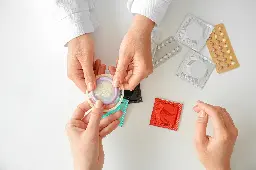
Finland’s multifaceted approach to preventing teenage abortions has proven highly effective, with a 66 percent reduction reported between 2000 and 2023. This large drop, owing to free contraception and obligatory sex education, serves as a model for public health programs.
The impact of free contraception
Finland’s choice to provide free contraception to teens has been game-changing. Mika Gissler, a research professor at the Finnish Institute of Health and Welfare (THL), emphasized the importance of early access to contraception in this beneficial trend. “We can assume that sexual education plays a significant role,” Gissler told Reuters, highlighting the value of both instruction and accessibility.
Beginning in the 2000s, Finland made morning-after medicines available without a prescription to everyone aged 15 and up. This measure was part of a larger campaign to combat the increased number of adolescent abortions that occurred during the 1990s. Finland created the groundwork for a continuous fall in teen abortion rates by ensuring that adolescents have the ability to avoid undesired pregnancies.
Comprehensive sexual education
In addition to providing free contraception, Finland made sexual education obligatory in all schools. This effort ensures that young people are knowledgeable about their sexual health and the options available to them. The integration of education and access has been critical. According to THL statistics, adolescent abortions have decreased dramatically, from 2,144 in 2000 to 722 in 2023 among those aged 19 and younger. The reduction was considerably more dramatic among those under the age of 18, accounting for 78 percent.
Legislative support and wider trends
Finland liberalized its abortion regulations in 2022, allowing abortions on request throughout the first 12 weeks of pregnancy without providing a justification. This legal amendment, which takes effect in September 2023, illustrates Finland’s progressive approach to reproductive rights, particularly in a global environment where such rights are under attack in many places.
While it is too early to know the entire impact of this legal reform on abortion rates, the move is intended to strengthen women’s reproductive health and rights. THL will continue to monitor and report on these patterns as new data become available.
A broader perspective
Although the decline in adolescent abortions is remarkable, the decrease in abortions among Finnish women of all ages is less spectacular. Over the last two decades, the overall number of abortions has stayed largely steady, with a little 2.9 percent increase from 2022 to 2023. This shows that, while youth gain from improved education and access to contraception, further interventions may be required to assist older age groups.
Finland’s accomplishment in lowering adolescent abortions by 66 percent demonstrates the efficacy of a complete program that includes free contraception and doesn’t shy away from mandatory sex education. As the government adjusts its policies and monitors their effectiveness, it provides a valuable model for other countries looking to enhance reproductive health and minimize unwanted pregnancies.
- Exclusive: Majority Of Voters Want Next Government To Take UK Back Into European Unionwww.huffingtonpost.co.uk Exclusive: Majority Of Voters Want Next Government To Take UK Back Into European Union
New poll shows the result of the 2016 Brexit referendum has been reversed.

- Russia: State-owned energy giant Gazprom is expecting difficult decade due to loss of European markets, new report commissioned by its management finds
- Bad developments for Gazprom are predicted even in optimistic scenarios. The study authors expect Gazprom’s natural gas exports to Europe to continue at an annual rate of 50 to 75 bcm until 2035. As the Europeans intend to reduce their imports of Russian pipeline gas to zero by 2027, this premise may seem unrealistic.
- What’s more, Gazprom can’t really hope to pivot towards LNG as many assume, according to the report: it doesn’t have the skills and technologies required to carry out large-scale projects in that area, especially in a very difficult environment marked by US sanctions.
- Chinese market will only be able to compensate for the major loss of income from the European market (compared to the period before 2022 and the war in Ukraine) with great difficulty. In addition, Moscow's talks with Beijing about the Power of Siberia 2 gas pipeline are moving forward only slowly makinv an agreement in 2024 unlikely.--
Bad news is piling up for Gazprom. Already hit hard by a historic loss in 2023, the Russian company is also facing Chinese intransigence: talks between Moscow and Beijing about the Power of Siberia 2 gas pipeline project are moving forward only with great difficulty, and a firm and final agreement this year looks unlikely at this stage. More recently, on June 12, it was revealed that the company’s gas production had fallen sharply last year to 359 bcm, as compared to 413 bcm in 2022 and 515 bcm in 2021. Gazprom’s only consolation is the fact that its total production (both oil and gas) rose by 6.6% last year to 72.4 MMtoe.
Above all, a recently published report commissioned by Gazprom’s management has poured cold water on the Russian group’s hopes for possible improvement within the next few years.
According to the 150-page document, the entire decade of the 2020s promises to be difficult for Gazprom. Yet the report’s authors haven’t adopted any catastrophic assumptions: they expect Gazprom’s natural gas exports to Europe to continue at an annual rate of 50 to 75 bcm until 2035.
As the Europeans intend to reduce their imports of Russian pipeline gas to zero by 2027, this premise may seem unrealistic.
But to continue exporting natural gas discreetly to the EU, the Russians are planning to rely on Turkey (which dreams of becoming a gas hub for the entire region). Gas transiting through Turkey would officially no longer be Russian but Turkish, or of indeterminate origin (Ankara could facilitate this system by importing gas from other countries, especially in the form of LNG). While such a situation hasn‘t materialized yet, this hypothesis isn’t totally far-fetched. And there’s even more good news for Gazprom: its exports to China (via the Power of Siberia 1 gas pipeline) will continue to grow, and the plan to supply the country via a new gas pipeline (Power of Siberia 2) is officially still on the table. So the export market (which is far more lucrative than the domestic market) isn’t a dead loss, mainly thanks to China.
However, since Russia’s invasion of Ukraine more than two years ago, experts studying Gazprom’s “case” have run their calculations and come to the obvious conclusion: the Chinese market will only be able to compensate for the major loss of income from the European market (compared to the period before 2022 and the war in Ukraine) with great difficulty. The report mainly focuses on the most pessimistic forecasts, starting with Gazprom’s market share of Russian gas exports, which can be expected to decline substantially in favor of LNG, and therefore of Novatek, which is (and will remain) the main player in this area.
What’s more, Gazprom can’t really hope to pivot towards LNG: it doesn’t have the skills and technologies required to carry out large-scale projects in that area, especially in a very difficult environment marked by US sanctions (although Novatek is well positioned technologically, its Arctic LNG 2 project, which the United States is trying to torpedo, is in difficulty).
The report commissioned by Gazprom is based on the assumption that US sanctions against Russia are set to last, in line with the policy that Washington has pursued against its other adversaries (namely Iran, North Korea, and to a lesser extent, Venezuela) for many years.
The 150-page report assumes that the Power of Siberia 2 project will probably be built eventually, increasing Russia’s export capacity to China by another 50 bcm. But even in that case, Gazprom won’t be out of the woods: first of all, the figure of 50 bcm isn’t very big when compared to the volumes that the Russian group was exporting to Europe before the war.
Furthermore, it’s by no means certain that Beijing will pledge to buy 50 bcm. Finally, everyone knows that the Chinese will probably negotiate very competitive prices from Gazprom for their future gas imports via Power of Siberia 2. As a result, Gazprom can’t expect this gas pipeline project to earn sky-high profits. Furthermore, the study commissioned by the Russian group expects Russian LNG exports (which would mainly benefit Novatek) to lie somewhere between 99 and 126 bcm in 2035, as compared to 41 bcm in 2020.
This sharp increase is certainly good news for the finances of the Russian government (and of course for Novatek), but not for Gazprom, which even in the best-case scenario would have only a minority slice of this pie. In the end, LNG will probably account for half of Russia’s natural gas exports by 2035. Unsurprisingly, the report’s authors believe that the Russian government will probably adopt a pragmatic stance, supporting and largely favoring its LNG sector rather than Gazprom and its gas pipelines.
- Barcelona will eliminate ALL tourist apartments in 2028 following local backlash: 10,000-plus licences will expire in huge blow for platforms like Airbnb - Olive Press News Spainwww.theolivepress.es Barcelona will eliminate ALL tourist apartments in 2028 following local backlash: 10,000-plus licences will expire in huge blow for platforms like Airbnb - Olive Press News Spain
BARCELONA'S city council has announced it will revoke all licenses for tourist apartments in the urban area by 2028. In a major win for anti-tourist

- 1,600-year-old coin discovered in Channel Islands features Roman emperor killed by invading Gothswww.livescience.com 1,600-year-old coin discovered in Channel Islands features Roman emperor killed by invading Goths
Archaeologists on the Channel Islands off the coast of France have found two coins from the Roman era.

- Greece introduces the six-day work weekwww.dw.com Greece introduces the six-day work week – DW – 06/21/2024
From the construction industry to the tourism sector, Greek employers cannot find the staff they need. The government's solution: longer working hours. A new law enables employers to implement a six-day work week

- How climate change is hitting Europe: three graphics reveal health impactswww.nature.com How climate change is hitting Europe: three graphics reveal health impacts
A growing body of research reveals the deaths and diseases linked to rising temperatures across the continent.
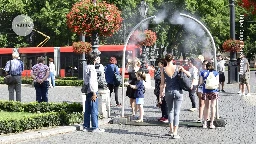
- “We Can Still Contact Technical Support in the West”: Russian weapons are being manufactured on foreign machinery — but why are they still running?
Machinery used to manufacture Russian armaments is being imported into Russia despite sanctions. However, to properly function, machines require components, as well as “brains” — which must also be imported. Without the manufacturer’s key, the machine cannot start, and without the software, it cannot operate. So, if imports are banned, how are these systems entering the country?
How Russia operates Western machinery
A machine is activated using an activation key, which is issued by the manufacturer after the sale and delivery of the product. Due to sanctions, Western firms cut ties with Russian clients, meaning munitions factories cannot legally obtain machinery or keys. Meanwhile, certain machines are equipped with GPS trackers, which enable manufacturers to know the location of their products. So, how can sanctions be circumvented under these conditions? One option is purchasing a machine without a GPS (or disabling it), and using the machine in, say, China, at least on paper.
An IStories journalist posing as a client contacted the Russian company Dalkos, which advertised services for supplying imported machinery on social media. A Dalkos employee explained that they make “fictitious sales” of equipment from the manufacturer to a “neighboring country”: “We provide these documents to the manufacturer. They check everything and give us feedback. They either believe us, allowing us to resolve our [Russian] customer’s problem… or they don’t believe us, and we respond that we couldn’t [buy the machine].” After the company in the “neighboring country” contacts the Western manufacturer, the latter sends the machine’s specifications, indicating whether GPS tracking is installed or not. “If we know that location tracking is installed, enabling them to see that it’s going to Russia — hence meaning we won’t be able to activate it — we’ll just tell you upfront that we can’t deliver the equipment,” the supplier explained. If everything goes smoothly, the machine along with the keys will be purchased by an intermediary company, and then Dalkos will import it into Russia and activate it at the client’s facility.
If a problem occurs with the machine’s computer system, the client should inform Dalkos, which will pass the information to the intermediary under whom the order was registered, and they will contact the manufacturer. The Russian enterprise should not seek customer support from the manufacturer directly: “You will simply compromise the legitimacy of our legal entity, which presents itself as an organization not connected to the Russian Federation in any way.”
The Dalkos website indicates that the company supplies equipment from multiple Western firms, including Schaublin, DMG MORI, and Kovosvit MAS. According to customs data from 2023, Dalkos received goods worth 188 million rubles ($2,120,000) from Estonia through the Tallinn-based company SPE (coincidentally belonging to the co-owners of Dalkos, Alexander Pushkov and Konstantin Kalinov) — with a UAE company acting as the intermediary party.The imported goods included components produced by the German machine tool manufacturer Trumpf.
The Dalkos employee stated that the company has “skilled guys” who manage to successfully circumvent sanctions: “We must import and help enterprises in these difficult times somehow.” According to him, in 2023, the company imported equipment and components worth 4.5 billion rubles ($50 million), and this year has signed contracts worth 12.5 billion rubles ($141 million). According to SPARK, the company’s revenue reached approximately 4.4 billion rubles (almost $50 million) in 2023.
During these “difficult times,” Dalkos assists enterprises in Russia’s military-industrial complex. IStories analyzed the company’s financial documents and found that, in 2023, its clients included the Dubna Machine-Building Plant (drones), Uralvagonzavod (tanks), and the Obukhov State Plant (air defense).
What if a machine is required but it has built-in GPS? According to the Dalkos employee, the company’s “multi-billionaire” clients have found technical specialists who can disable GPS trackers. This topic is widely discussed on machinery chat forums. Our journalist tracked down a company that offers machine modernization services, promising to disable a GPS for between half a million to a million rubles ($5600 - $11,200).
How Russia uses Western software
Humans communicate with machines via a computer. Designing a part requires Computer-Aided Design (CAD) software; to manufacture it, Computer-Aided Manufacturing (CAM) software is required, and so forth. These and other programs are integrated in a special digital environment, not dissimilar to how we install individual applications on iOS or Android operating systems. The environment in question is called PLM — Product Lifecycle Management, which refers to the strategic process of managing the lifecycle of a product from design and production to decommissioning. Nowadays, systems simply cannot function without PLM.
In Russia, the PLM market is dominated by Siemens (Germany), PTC (USA), and Dassault (France). Naturally, all these companies were linked to the military-industrial complex (for example, here and here) and now, formally at least, comply with sanctions. The IStories journalist, under the guise of a client, spoke with several Russian PLM suppliers.
An employee at Yekaterinburg-based PLM Ural — a long-time supplier of Siemens PLM — said that they still have licenses available: “We have a pool of perpetual licenses that we’re ready to sell. The only problem is that they can’t receive the latest software updates. I think they’re from 2021 or 2022.” According to him, these versions will function for another 10-15 years, but if problems occur, the company’s own specialists will resolve them. “They [Siemens employees] can’t disable it [PLM] because the file works completely autonomously. They don’t have access. Such closed-loop PLM solutions are installed in many defense enterprises,” stated the PLM Ural employee.
A Russian PLM specialist confirmed to IStories that this is exactly how it works. Additionally, according to him, PLM distributors can unlawfully reuse the same license across several factories if their manufacturing processes are unconnected. The possibility of such a scheme was confirmed by another specialist.
The Dassault Systemes website continues to reference its Moscow office. Our journalist contacted the establishment before being redirected to the Russian IT company, IGA Technologies. A company employee recommended the purchase of a PLM 3Dexperience system. According to him, their firm has a partner in the Netherlands who can access the software, “because we are an official partner of Dassault.” However, the Russian client does not purchase the software program per se: “From a documentation standpoint, it’s processed as a service provision. But it isn’t a software purchase. We don’t sell any software because it is, in fact, pirated.” “This is a well-established practice,” — the employee clarified — “I have more than ten clients currently using the system. We started doing this after the sanctions were imposed, which caused issues with license keys. And we had deals that were approved and paid for before the sanctions were introduced... but they couldn’t deliver the keys to us.”
IStories identified Dassault’s partner in the Netherlands — Slik Solutions (formerly IGA Technologies) — via their website. It is primarily owned by the Russian company Implementa (per the company’s own disclosure in 2022), while a third of Implementa is owned by IGA Technologies (according to current data from the Russian company register).
“We can still contact technical support in the West for various issues, and they actually respond,” revealed an employee at IGA Technologies. However, according to him, this is not a particularly sought after service, since PLM works so faultlessly on servers that the need to source an upgrade is unlikely: “The system is so effective that it could automate the whole of Roscosmos for ten years without interruption.”
According to IGA Technologies’ financial documents for 2023 acquired by IStories, its clients include the NL Dukhov All-Russian Scientific Research Institute of Automatics (nuclear munitions), the Raduga State Machine-Building Design Bureau (missiles), the Rubin Central Design Bureau for Marine Engineering (submarines), and the Kirov Plant Mayak (anti-aircraft missiles).
PLM from the American software giant PTC is sold in Russia by Productive Technological Systems (PTS), whose clients include enterprises in the military-industrial complex. A PTS employee reassured us that if critical problems arise that cannot be resolved by the Russian contractors’ technical support team, their company will contact the manufacturer: “We have access to PTC’s technical support, and we can contact them if necessary. Generally, we support all the systems ourselves because we understand how they work.”
PTS’ financial documents indicate that its clients included the MNPK Avionika (missiles and bombs), the NL Dukhov All-Russian Research Institute of Automatics (nuclear munitions), and the Central Scientific Research Institute of Chemistry and Mechanics (munitions).
Responses without answers
IStories attempted to contact all the companies mentioned in this article.
Trumpf was the only manufacturer to respond with a generic statement reminiscent of those given by other large Western manufacturers. Trumpf asserts that they comply with all sanctions and officially exited Russia in April 2024, but it cannot speak for its buyers, who may buy or resell products anywhere. For instance, the Estonian company SPE has not received goods directly from Trumpf since 2018, but nothing prevents it from trading through other dealers. The same is true of Dalkos, which has been a client since 2016.
PLM Ural replied that it stopped selling licensed Siemens PLM software in 2022.
So far, no one else has responded.
- Denmark’s radical plan for a plant-based future: The Nordic country is working toward ambitious goals to make its food systems more sustainable — and other nations are following in its pathreasonstobecheerful.world Denmark's Radical Plan for a Plant-Based Future
The Nordic country is working toward ambitious goals to make its food systems more sustainable — and other nations are following in its path.

Trine Krebs is sometimes called “the leek woman,” or even Miss Dry-Legume, of Denmark. The 48-year-old has for decades traveled around the country as, in her words, a “food inspirer,” proselytizing about all things vegetables.
“It’s very important to have locally grown food,” says Krebs, who has a 12-hectare farm replete with 50 different vegetables on the outskirts of Copenhagen. “It’s something that I’m concerned about; what is seen in our landscapes.”
So when, in October 2023, the Danish government published the world’s first ever national action plan for shifting towards plant-based diets, Krebs was ecstatic. Finally, everyone else was catching up with her.
Under the radical policy, a new action plan will be published every year focusing on the most pressing priorities in combination with an overarching, multi-year strategy including government spending for what’s known as the Plant-Based Food Grant, in an effort to make the nation’s food systems more sustainable for the planet.
“Plant-based foods are the future,” announced Jacob Jensen, Denmark’s Minister for Food, Agriculture and Fisheries, at the time. “If we want to reduce the climate footprint within the agricultural sector, then we all have to eat more plant-based foods.”
Concretely, the Danish government has three main goals: to increase demand for plant-based foods, to develop supply for plant-based foods, and to improve how all the different stakeholders — from scientists to farmers and chefs, food sociologists, and nutrition experts — in this nascent domestic industry are working together.
The efforts to drum up demand focus on boosting plant-based food consumption in public and private restaurants, canteens and food services (public kitchens serve up to 650,000 meals to Danish people a day); the private consumption of plant-based foods by Danish people; and consumption in foreign export markets such as the UK. The supply efforts focus on raising the quantity, quality and variety of Denmark’s plant-based food production, with research and development set to play a huge role.
Plant-based foods, according to the strategy, include everything from root vegetables to buds, stems, flowers, fruits and seeds as well as fungi, yeasts, seaweed and algae. A market projection in 2022 by researchers at the University of Copenhagen found that there are 15 plant-based protein crops, such as peas and almonds, suitable for cultivation in Denmark.
Danish authorities see reducing meat and dairy consumption as key to reaching the Nordic state’s goal of cutting carbon emissions by 70 percent before 2030, when compared to 1990. The climate think tank Concito estimates that more than half of Denmark’s land is used for farming and that agriculture accounts for about a third of its carbon emissions. The UN’s Food and Agricultural Organization estimates that meat and dairy account for about 14.5 percent of global greenhouse gas emissions.
Yet a major study published in 2021 found that the emissions made by producing plant-based foods are roughly half the amount incurred by meat production — which advocates say underlines the massive cuts that can be achieved by adapting diets.
“At the beginning, I wasn’t so much focused on agriculture, but when you look at the emissions and our land use for farming, you understand it’s a huge deal,” says Ida Auken, a member of parliament for Denmark’s Social Democrats party who, as the country’s former environment minister, was at the forefront of the policy. “Danes have to change the way that we eat.”
Denmark believes, however, that the necessary shift toward plant-based eating also offers a massive economic opportunity. AgriFoodTure, a research and innovation partnership of Danish universities, companies and other organizations, estimates that if the country were to gain a three percent share of the global plant-based food market, it could create up to 27,000 jobs and bring in 13.5 billion Danish kroner, or DKK ($1.9 billion).
“Building a strong domestic market for plant-based foods will reduce the climate footprint of the Danish people, but will also help to put Danish companies in a stronger position on export markets,” the government strategy notes.
And according to research by the University of Copenhagen, if Danes ate according to climate-friendly guidelines, it would prevent 1,000 deaths a year, cut the country’s emissions by 31 to 45 percent and save DKK 12 billion ($1.7 billion) in health costs.
The publication of Denmark’s national action plan follows the 2021 investment of DKK 1.25 billion ($182 million) to advance plant-based foods, most of which went into the fund.
The first tranche of funding, which totalled DKK 58.2 million ($8.47 million) for 36 projects, was granted last November and spans proposals to develop plant proteins, to train chefs in plant-based cuisine and for national information campaigns.
For example, the start-up PlanetDairy is working on plant-based versions of natural yogurt and Danbo, a popular cow’s milk cheese from Denmark, through “precision fermentation” to produce “milk” proteins made out of peas and broad beans (fava beans).
Others are looking to boost nut, oat and barley production; to research the “culinary potential” of mushrooms (which have the unique umami flavor); and to improve seaweed cultivation both on and off-shore — as well as creating new sustainable preservation methods such as a seaweed-based pesto.
Meanwhile, practical initiatives that were funded include a new vegetarian degree program at Denmark’s hospitality school, a “knowledge center” about plant-based cooking for chefs and students and a “vegan travel team” — proposed by Krebs — to train chefs around the country who are usually schooled in traditional, French-style methods despite the fame of Noma (the country’s celebrated, best-in-the-world restaurant known for its innovative use of foraged local ingredients).
“I’m very happy about it,” says Krebs, who works for the Food Organisation of Denmark, which helps restaurants to become more sustainable. Her travel team project will begin after the summer, prioritizing chefs in touristic coastal areas, which tend to lack vegetarian options, but she’s already started live-streaming cooking sessions from public kitchens that have made plant-based strides forward.
The second round, which is offering a much higher funding total of DKK 122 million, received 101 applications corresponding to grants of DKK 334 million, reflecting the significant interest in the project. The winners will be announced in August.
Rune-Christoffer Dragsdahl, secretary-general of the Vegetarian Society of Denmark, who helped draft the plan, says that it was put together in a “very holistic” way.
“It supports everything from farm to fork,” he adds. “Some of the most promising stuff is to educate professionals, because if you put too much burden on the individual, it’s too optimistic. We do need product solutions, too.”
Yet the cultural barriers in Denmark, which is one of the largest producers of pork in the world, pose a complex dilemma. A survey in 2019 found that although about 11.5 percent of Danes intended to reduce their meat consumption, and 27.5 percent had already done so, 57 percent had no intention to reduce their meat intake at all.
And while the Danish government updated its official dietary guidelines in 2021, recommending that adults eat just 350 grams of meat a week — the equivalent of about three hamburgers — the current level of meat consumption is about triple that.
That’s why the “nudge” approach of using better branding for plant-based foods as well as developing “hybrid” options — for example, substituting some of the pork in sausages with beetroot — are part of the plans.
“We still eat far too much meat,” says Dragsdahl. “But we can’t just force people against their will.”
The risks of failing to secure buy-in from the farming industry are also stark. In the Netherlands, an effort in 2019 to crack down on emissions by buying out livestock farms led to huge, tractor-led protests. In November 2023, Italy’s government banned laboratory-grown meat in a move the agriculture minister framed as “safeguarding our food, our system of nutrition … that we have enjoyed for millennia.” In recent months, France, Spain, Belgium and Bulgaria have been hit by farmer-led protests.
Denmark’s efforts to get farmers on board are complicated by the prospect of a looming carbon tax on agriculture. In February 2024, an expert committee commissioned by the Danish government presented the Green Tax Report, which includes policy proposals such as a farming emissions tax of DKK 750 ($109) per metric ton emitted.
Denmark has therefore approached the topic carefully, according to Auken, and has opted to focus on spurring demand for the new sector and the economic benefits it will bring rather than cracking down on the meat-based agricultural sector.
“We can’t repeat what was done to the coal miners,” she says of Denmark’s powerful meat industry. “We don’t want to turn this into a fight between pro- and anti-meat.”
Instead, Auken argues workers in agriculture should be retrained in the same way that Denmark’s offshore oil and gas workforce successfully transitioned into the offshore wind sector, which is now a multibillion-dollar export industry.
“There’s a need for those skills,” she says. “The workers are not obsolete.”
The strategy has been developed in close collaboration with Denmark’s largest farmers association as well as the large organic farming industry, which is seen as having a close synergy with the plant-based food sector.
“I’m talking a lot to union leaders,” says Auken. “I’m showing them some of those market opportunities.”
While it is still too early to quantify the impact of Danish diets, Acacia Smith, senior policy manager at the Good Food Institute Europe, a think tank, said in an email that Denmark has set an “important precedent” by publishing the action plan.
“Europe is the world’s biggest market for plant-based meat, and to take advantage of this growing industry — as well as to boost food security and create future-proof green jobs — other national governments should follow,” she added.
Other nations are indeed following Denmark’s plant-based path. In January, South Korea announced a KRW 63.9 billion ($47 million) food-tech budget for 2024 to develop plant-based substitute foods, food robots and food upcycling. The German government has allocated €38 million ($41 million) in the 2024 budget for the promotion of plant-based, precision-fermented and cell-cultivated proteins. And Portugal’s Vegetarian Association created a National Plan for plant-based proteins.
But despite the positive signs, Dragsdahl is concerned by the lack of accountability in Denmark’s plans: He had argued for the inclusion of targets like investment into research and development, hectares of land cultivated using legumes and public procurement. “It was a disappointment for us, the lack of concrete targets,” he says.
In turn, to really succeed in getting meat off the menu, Auken says that wider reform of the European Union’s agricultural policy is needed. “We’ve had some successes, but it’s still very, very early,” she says. “This isn’t a wheel we can turn on our own.”
But Krebs is enthusiastic about Denmark’s progress towards a plant-based future. “If we can make vegetables sexy and tasty, we can also economize,” she says. “What’s been done already is incredible.”
- Italian carmaker fined for selling China-made cars as Italianwww.bbc.com Car maker fined $6.4m for selling China-made vehicles as Italian
Italian officials said DR Automobiles misled customers into thinking its cars were made in Italy.

- The Italian government has fined a car company $6.4m (£5m) for allegedly branding vehicles that were made in China as being produced in Italy.
- The move comes as Italy and the European Union (EU) as a whole are cracking down on cars produced outside the trading bloc.
- Last month, dozens of Morocco-made Fiat Topolinos were seized in the Italian port of Livorno because they had Italian flag insignia.--
DR Automobiles misleadingly marketed cars as being produced in Italy, even though they were mostly made in China, according to the country's competition regulator.
The firm said it would appeal against the fine as it had never claimed its vehicles were completely made in Italy.
Southern Italy-based DR Automobiles assembles low-cost vehicles, using components produced by Chinese car makers Chery, BAIC and JAC.
The regulator said cars under the company's DR and EVO brands were sold as being Italian-made but were largely of Chinese origin.
Only minor assembly and finishing work was carried out in Italy, it said.
"This practice has coincided with a period in which the company recorded marked growth in sales of DR and EVO vehicles in the Italian market," the authority added.
The move comes as Italy and the European Union (EU) as a whole are cracking down on cars produced outside the trading bloc.
Last month, dozens of Morocco-made Fiat Topolinos were seized in the Italian port of Livorno because they had Italian flag insignia.
Fiat's parent company Stellantis said it had followed regulations but has since removed the flags from the vehicles.
In April, Alfa Romeo, which is another Italian brand under Stellantis, decided to rename its new, Poland-made Milano model as Junior following pressure from authorities.
Last week, the EU threatened to hit Chinese electric vehicles with import taxes of up to 38%, after politicians called them a threat to the region's motor industry.
These charges would come on top of the current rate of 10% levied on all Chinese electric car imports to the EU.
In response, China said the tariffs violated international trade rules and described the investigation as "protectionism".
The announcement came after the US last month raised its tariff on Chinese electric cars from 25% to 100%.
- Stonehenge sprayed with paint by environmental protesterswww.dw.com Stonehenge sprayed with paint by environmental protesters – DW – 06/19/2024
The prehistoric megalithic structure in England has been targeted by activists spraying orange powder paint, social media footage showed.

- Beaten schoolchildren, military training, and Kremlin propaganda: new report accuses Russia of violating international law through 'Russification' of Ukrainian education systemwww.hrw.org Education under Occupation
The 63-page report “Education under Occupation: Forced Russification of the School System in Occupied Ukrainian Territories,” documents violations of international law by the Russian authorities in relation to the right to education in formerly occupied areas of Ukraine’s Kharkivska region, and othe...
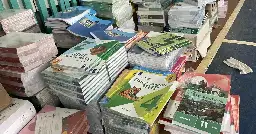
- Russian authorities are imposing the Russian curriculum and Kremlin propaganda in Ukrainian schools in occupied areas of Ukraine and have retaliated against school workers if they refuse to implement the imposed Russian curriculum, a report published by Human Rights Watch days.
- Any criticism of the invasion in schools is subject to retaliation by occupying authorities. For exampke, Russian proxies in occupied Melitopol punished a student who spoke Ukrainian in school by driving him dozens of kilometers with a bag over his head to a remote area and abandoning him to walk back home alone.
- Occupying authorities have beaten school children who expressed peaceful opposition to the occupation. In Melitopol, Hanna Bout, a teacher at the Professional Agricultural Lyceum who was an awardee as one the best teachers in Ukraine in 2021, said, “They changed the flags to Russia’s on February 25 [2022]. We protested against the occupation until March 18, when they beat demonstrators harshly. They beat a girl under 18 and broke her ribs for having a Ukrainian flag painted on her cheek.”
- The report documents the week-long detention, in dire conditions, of a school principal from Borivske village in Kharkivska region, whom security officers beat repeatedly for refusing to hand over information about his school.
- Russian authorities have [illegally] introduced textbooks and lessons in schools in occupied areas of Ukraine that falsify history to justify Russia’s invasion of Ukraine and the authorities have also introduced military training, and require secondary schools to send them lists of students aged 18 and older who are eligible for conscription into the Russian armed forces.
- Among others, the Russian curriculum in Ukraine falsely claim that Russian forces do their utmost of protect civilians and do not under any circumstances attack “residential areas” while alleging that Ukrainian forces routinely use “their own citizens… as a human shield.”
- In the 2024-25 school year, Russia’s education ministry will also introduce compulsory lessons for 15- to 18-year-olds in occupied Ukrainian territories and in Russia, “Fundamentals of Security and Defense of the Motherland,” using another new textbook that includes false claims, such as that after 2014 "Russian books were burned” in Ukraine, “the Russian language [was] banned... [and] 'Russian blood' cocktails were served in restaurants".
- Russia’s Defense Ministry that prepares children to join the military, disseminates anti-Ukrainian propaganda, and is active in occupied Ukrainian territories as well as in Russia.
- According to a UN report published in March 2024, Russian authorities also inducted Ukrainian children in Zaporizhzhia into the “Youth South” movement where they participate in “maintaining public order” and “interact directly” with frontline Russian soldiers, according to an occupation official.
- EU Council has withdrawn the vote on Chat Control - Stack Diarystackdiary.com EU Council has withdrawn the vote on Chat Control - Stack Diary
The EU Council and its participants have decided to withdraw the vote on the contentious Chat Control plan proposed by Belgium, the current EU President. According to Netzpolitik (German),
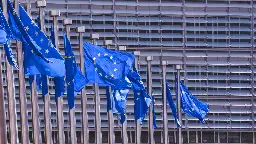
- Pro-Kremlin Doppelganger campaign continued its copycatting and reality-distorting activities during the European Parliament elections, report says
For those who may not know:
> Doppelganger is the name given for a Russian disinformation campaign established in 2022. It targets Ukraine, Germany, France and the United States, with the aim of undermining support for Ukraine in Russia's invasion of the country.
Here is the report (pdf)
- The campaign employs domain cloning and typosquatting techniques to create websites that impersonate legitimate European media entities. These inauthentic sites, which steal credibility from real media entities, are used to disseminate fabricated content designed to exploit political polarisation, promote Euroscepticism, and undermine specific political entities and governments while purportedly supporting others.
- The narratives employed by the Doppelganger campaign are tailored to specific countries, reflecting the campaign’s strategic approach and goals.
- For instance, content targeting France focusses predominantly on migration and the war in Ukraine, while content aimed at Germany emphasises energy and climate issues along with the war in Ukraine. In Poland, narratives centre on Ukrainian refugees, the war in Ukraine, and migration, whereas Spanish-language content similarly utilises narratives related to the war in Ukraine.
- Pro-Kremlin disinformers attempt to smear leaders; sow distrust, doubt, and division; flood social media and information space with falsehoods; drag everyone down into the mud with them, and finally, end up dismissing the results.
Sophisticated tactics
The Doppelganger campaign utilises a sophisticated, multi-stage approach to amplify its disinformation efforts. We have identified four key stages in the coordinated amplification process, illustrated below in an example from the X platform.
- Content posting: a group of inauthentic accounts, referred to as ‘posters,’ initiates the dissemination process by publishing original posts on their timelines. These posts typically include a text caption, a web link directing users to the Doppelganger’s outlets, and an image representing the article’s thumbnail.
- Amplification via quote posts: a larger group of inauthentic accounts, called ‘amplifiers,’ then reposts the links of the original posts without adding any additional text. This amplification method, known as ‘Invisible Ink(opens in a new tab)’, uses standard platform features to inauthentically boost the content’s visibility and potential impact on the target audience.
- Amplification via comments: amplifier accounts further boost the reach of the FIMI content by resharing the posts as comments on the timelines of users with large followings. This strategy aims to expose the content to the followers of authentic accounts, increasing its penetration within new audiences.
- Dissemination via deceptive URL redirection: to evade platform restrictions on posting web links to blacklisted domains, the network employs a multi-stage URL redirection technique. Inauthentic accounts post links that redirect users through several intermediary websites before reaching the final destination – an article published on a Doppelganger campaign website. This complex redirection chain, managed with meticulous infrastructure practices, demonstrates the network’s determination to operate uninterrupted while monitoring the effectiveness of its influence operations.
Our democratic processes under fire
The Doppelganger campaign underscores the persistent threat posed by foreign actors who utilise FIMI and inauthentic websites to interfere in democratic processes across Europe.
An in-depth analysis of 657 articles published by a sample of 20 inauthentic news sites associated with the Doppelganger campaign revealed a steady increase in election-related content as the elections approached.
Two weeks before the elections, 65 articles published by the network were directly related to the elections, and this number rose to 103 articles in the final week. The primary targets of this election-focussed activity were France and Germany, with additional articles published in Polish and Spanish.
Although the full impact of this campaign is challenging to measure, our findings indicate that the Doppelganger campaign did not cause significant disruption to the normal functioning of the electoral process or pose a substantial threat to the voting process. However, the persistent nature of the Doppelganger operation highlights the need for continuous vigilance and robust countermeasures to protect the integrity of our democratic processes.
- Germany and Italy are the biggest climate laggards in Europe, study findswww.businessinsider.com Germany and Italy are the biggest climate laggards in Europe, study finds
Germany and Italy could be forced to spend an upwards of €15 billion on carbon credits to comply with an EU law.

- NATO Member Sweden Says Russia Disrupting Its Satellite Networkswww.swissinfo.ch Newest NATO Member Sweden Says Russia Disrupting Its Satellite Networks
(Bloomberg) -- Swedish authorities say Russia is behind “harmful interference” deliberately targeting the Nordic country’s satellite networks that it first noted days after joining NATO earlier this year.
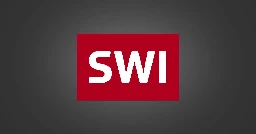
Swedish authorities say Russia is behind “harmful interference” deliberately targeting the Nordic country’s satellite networks that it first noted days after joining NATO earlier this year.
The Swedish Post and Telecom Authority asked the radio regulations board of the Geneva-based International Telecommunications Union to address the Russian disruptions at a meeting that starts Monday, according to a June 4 letter to the United Nations agency that has not been previously reported.
The PTS, as the Swedish agency is called, complained to Russia about the interference on March 21, the letter said. That was two weeks after the country joined the North Atlantic Treaty Organization, cementing the military alliance’s position in the Baltic Sea.
Russia has increasingly sought to disrupt European communication systems since the 2022 invasion of Ukraine, as it tests the preparedness of the European Union and NATO. European satellite companies have been targeted by Russian radio frequency interference for months, leading to interrupted broadcasts and, in at least two instances, violent programming replacing content on a children’s channel.
Swedish authorities said interference from Russia and Crimea has targeted three different Sirius satellite networks situated at the orbital position of 5-degrees east. That location is one of the major satellite positions serving Nordic countries and eastern Europe.
Kremlin spokesman Dmitry Peskov said he was unaware of the issue. A spokesperson for Sweden’s PTS declined to comment beyond the contents of the letter.
“These disruptions are, of course, serious and can be seen as part of wider Russian hybrid actions aimed at Sweden and others,” Swedish Prime Minister Ulf Kristersson said in a statement to Bloomberg. “We are working together with other countries to find a response to this action.”
Kristersson added that the disruption affected TV broadcasts in Ukraine that relied on the targeted satellite, which is owned by a Swedish company, which he didn’t identify.
France, the Netherlands and Luxembourg have filed similar complaints to the ITU, which coordinates the global sharing of radio frequencies and satellite orbits. The countries are all seeking to discuss the interference at the Radio Regulations Board meeting next week.
The issue is the latest problem in the Baltics and Nordic regions attributed to Moscow. Sweden was the victim of a wave of cyberattacks earlier this year suspected of emanating from Russia.
In April, Estonia and Finland accused Moscow of jamming GPS signals, disrupting flights and maritime traffic as it tested the resilience of NATO members’ technology infrastructure.
Brussels raised the issue at an ITU Council meeting earlier this month. “We express our concern, as several ITU member states have recently suffered harmful interferences affecting satellite signals, including GPS,” the EU said in a statement on June 10.
Starlink Block
The Radio Regulations Board is also set to discuss the ongoing dispute between Washington and Tehran over whether Elon Musk’s Starlink satellite network should be allowed to operate in Iran.
Iran has sought to block Starlink, arguing that the network violates the UN agency’s rules prohibiting use of telecommunications services not authorized by national governments. The board ruled in favor of Iran in March.
- Leak: EU interior ministers want to exempt themselves from chat control bulk scanning of private messages - EU Reporterwww.eureporter.co Leak: EU interior ministers want to exempt themselves from chat control bulk scanning of private messages - EU Reporter
According to the latest draft text of the controversial EU Child Sexual Abuse Regulation proposal leaked by the French news organisation Contexte, EU interior ministers want to exempt professional accounts of staff of intelligence agencies, police and military from the envisaged scanning of chats an...

- Russia turns to blackmail and 'financial incentives' to hire Germans to spy to make up for expelled diplomats, German agency says
Russia has turned increasingly to blackmail and financial incentives to hire Germans to spy for it after the blow dealt to its intelligence services by Europe's expulsion of some 600 Russian diplomats, Germany's domestic security service said.
The Federal Office for the Protection of the Constitution (BfV) said Russian intelligence services were spending big to recruit agents in Germany despite Western attempts to limit their operations since Moscow's invasion of Ukraine. "Russia is working hard to compensate for the German government's reduction in the number of Russian agents in Germany," BfV chief Thomas Haldenwang told a news conference upon presenting the agency's annual report.
Two German citizens who were charged last August with high treason for spying for Russia had each been paid an estimated 400,000 euros ($428,560) for their services, the BfV said.
"The agent fees show that Russia's services continue to have enormous financial resources with which to pursue their intelligence goals," it added in the report.
Particularly at risk of being targeted by Russian security services were Germans who lived in Russia or regularly travelled there, including German diplomats, who could easily be made vulnerable to blackmail attempts.
"As soon as they have compromising information about their targets, these services are not shy about employing aggressive recruitment techniques," they added.
NATO reaffirmed this month its concerns about Russian espionage and called for tougher action in response to what it said was a campaign of hostile activities, including sabotage and cyber attacks. Germany is one of 32 NATO states.
Far right
Russia's invasion of Ukraine on Feb. 24, 2022, was a rude awakening for many in Germany's security establishment after years in which Berlin had attempted to bind Moscow into the international legal order through a web of trade and especially energy links.
A recent surge in support for the far-right Alternative for Germany (AfD) party and the authoritarian-left BSW party has also helped trigger a major rethink. Both parties often echo Kremlin talking points on the war, including in their opposition to providing Ukraine with arms to defend itself.
The number of right-wing and left-wing extremists rose once more last year by 4.6% and 1.4% respectively to 40,600 and 37,000, according to the BfV report, contributing to public discourse moving away from factual debate towards "aggressive confrontation".
Russia has proved adaptable in finding ways of influencing events in Germany even after its media channels were banned and 600 of its diplomats stationed around Europe were expelled, the BfV said.
Some of those influencing efforts have shifted to the social media platform Telegram, which is difficult to police, while spies are now being attached to international organisations. Russian officers tasked with handling informants are now travelling to do so rather than being based in Germany.
Far-right groups are also a receptive audience for Russian influence operations. These include the Reichsbuerger (Citizens of the Reich) conspiracy theorists, some of whom are now on trial for plotting a coup against the German democratic order for which they had sought Russian support.
Among new conspiracies circulating in far-right circles, the BfV said, is a groundless belief that the war in Ukraine is intended to create a depopulated wasteland in the country's east to which the population of Israel could be relocated. It said Ukrainian President Volodymyr Zelenskiy, being Jewish, was falsely presented as being one of the conspirators.
- Too much of a good thing? Spain's green energy can exceed demand, country is looking at storing capacity or buyers to solve electricity oversupplywww.bbc.com Too much of a good thing? Spain's green energy can exceed demand
Spain is looking at storing electricity or increasing demand to solve electricity oversupply.
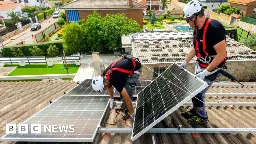
The patchwork plains of Castilla-La Mancha, in central Spain, were once known for their windmills.
But now it is wind turbines, their modern-day equivalent, which are much more visible on the region’s skyline.
The 28 vast turbines of the Sierra del Romeral windfarm, perched on hills not far from the historic city of Toledo, look out over this landscape.
Operated by Spanish firm Iberdrola, they are part of a trend that has accelerated Spain’s renewable energy output over the past half-decade, making the country a major presence in the industry.
Spain’s total wind generation capacity, its prime renewable source in recent years, has doubled since 2008. Solar energy capacity, meanwhile, has increased by a factor of eight over the same period.
This makes Spain the EU member state with the second-largest renewable energy infrastructure, after Sweden in first place.
Earlier this year, Spain's Socialist Workers' Party prime minister, Pedro Sánchez, described his country as "a driving force of the energy transition on a global scale".
The boom began soon after the arrival of a new government under Mr Sánchez in 2018, with the removal of regulatory obstacles, and the introduction of subsidies for renewable installation. The pandemic further accelerated the trend on a domestic level.
"The impact of Covid was very positive for our sector," says José Donoso, chief executive of UNEF, the Spanish Photovoltaic Association, which represents the solar panel sector. "People saved money, took time to think about what to do with it, and many of them decided that it was better invested on their roof than in their bank."
Meanwhile, the government introduced ambitious new targets, including covering 81% of Spain’s electricity needs with renewables by 2030.
However, behind this success story, there are concerns within the electricity industry caused by an imbalance between supply and demand with, at times, a surplus of electricity.
Even though the Spanish economy has bounced back strongly from the trauma of the Covid pandemic, and is growing faster than all of the bloc’s other big economies, electricity consumption has been dropping in recent years.
Last year, demand for electricity was even below that seen in the pandemic year 2020, and the lowest since 2003.
"What we saw until 2005 was that when GDP increased, demand for electricity increased more than GDP," says Miguel de la Torre Rodríguez, head of system development at Red Eléctrica (REE), the company that operates Spain's national grid.
More recently, he says, "we've seen that demand has increased less than GDP. What we're seeing is a decoupling of energy intensity from the economy".
There are several reasons for the recent drop in demand. They include the energy crisis triggered by Russia's invasion of Ukraine in 2022, which caused businesses and homes across Europe to cut back on usage.
Also, energy efficiency has improved and become more commonplace.
The increased usage of renewable energy has also contributed to the reduction in demand for electricity from the national grid.
Mr Rodríguez says that during daylight hours, when solar energy output is particularly strong, the supply-demand balance can be pushed out of kilter, having an impact on prices.
"Since the power system always has to have an equilibrium – demand has to equal generation – that has meant there has been excess generation during those hours," he says.
"That has driven prices down, especially during certain hours, when the prices have been zero or even negative."
While such low prices are welcome for consumers, they are potentially a problem when it comes to attracting investment to the industry.
"This can make it more difficult for investors to increase their investment in new electricity based on renewable energies," says Sara Pizzinato, a renewable energy expert at Greenpeace Spain.
"That can be a bottleneck for the energy transition."
Concerns about Spain having an excess of electricity have led to discussion of the need to accelerate the "electrification" of the economy, which involves moving it away from fossil fuels. The Sánchez government has set a target of making 34% of the economy reliant on electricity by 2030.
"This process is going slowly, and we need to accelerate it," says UNEF’s José Donoso.
"Electricity is the cheapest and most competitive way to produce clean energy.
"We need facilities that use electricity in place of fossil fuels."
Shifting to a total reliance on electricity is seen as unrealistic, as some important sectors like chemicals and metals will find the transition difficult.
However, Mr Donoso and others see plenty of scope for swifter electrification. For example, Spain is trailing many of its European neighbours when it comes to the installation of heat pumps in homes, and the use of electric cars, which only make up around 6% of vehicles on the road.
Ms Pizzinato agrees that electrification is crucial, but says there are other ways of tackling the supply-demand quandary, including phasing out the use of nuclear plants more quickly, and increasing energy storage capability.
She says: "We need to engage more people and more industries in demand-side management, to make sure the flexibility needed in the system is out there to make generation and demand match better during the day and during the night."
- Beijing urges Britain to stop sanctioning Chinese firms over Russian links
China's commerce ministry said on Wednesday that it had urged Britain to stop sanctioning Chinese firms after the country sanctioned five Chinese companies over their links to Russia.
In a statement, the ministry said China "firmly opposes Britain's actions on the grounds that the Chinese companies are "related to Russia."
Britain last week imposed its first sanctions targeting vessels in Russian President Vladimir Putin's "shadow fleet" that it said was used to circumvent Western sanctions on the trade in Russian oil.
The action, part of 50 new sanctions and coordinated with G7 partners, also targeted suppliers of munitions, machine tools, microelectronics, and logistics to Russia's military, including entities based in China, Israel, Kyrgyzstan and Turkey, the British government said.
Britain's approach has ignored China's representations and the momentum and had a negative impact on economic and trade relations between China and the UK, China's commerce ministry said.
"Britain's approach is a unilateral sanction that has no basis in international law," it added. "We urge Britain to immediately correct its erroneous practices."
- Client-Side-Scanning: 'Chat Control is Pure Surveillance State'netzpolitik.org Client-Side-Scanning: Chat Control is Pure Surveillance State
The planned chat control makes the world less secure and more authoritarian, as it is directed against private and encrypted communication. Proponents are using disinformation, lies, and sleight of hand to push through the project. But chat control can still be stopped. A commentary.

The planned chat control makes the world less secure and more authoritarian, as it is directed against private and encrypted communication. Proponents are using disinformation, lies, and sleight of hand to push through the project. But chat control can still be stopped. A commentary.
For years, legions of IT experts and security researchers, lawyers, data protection experts, digital organizations, tech companies, messengers, UN representatives, child protection experts, guardians of internet standards, scientists, and anyone else with expertise have been raising alarms around the world: chat control is dangerous. It is a new form of mass surveillance. It will weaken the IT security of us all. It would introduce a surveillance infrastructure on apps and end devices beyond the EU that authoritarian states will use to their advantage.
Ultimately, chat control is a frontal attack on end-to-end encryption. Put simply, this form of encryption ensures that the sender puts their message in an envelope that can only be opened by the recipient. With the planned chat control, the envelope is not forcibly opened on the way to the recipient; instead, the contents of the envelope are analysed before being inserted into the envelope. So when you write a letter, your private data is looked at directly over your shoulder. Nothing Is Private Anymore When Chat Control Arrives
Those in favour of chat control now claim that the envelope – in this case, end-to-end encryption – would not be opened and that communication would therefore be secure and encrypted. It’s a shabby and transparent sleight of hand: after all, what is the protective envelope worth if what we send to other people is screened by default before it is sent? And where is the good old privacy of correspondence for our digital letters on WhatsApp, Signal, or Threema? What right do you have to monitor what I do and what I send on my mobile phone, tablet, and computer? How dare you!
The fact is that it is not technically possible to monitor all content at the same time and still guarantee private and secure communication. It simply isn’t possible. But the EU Commissioner for Home Affairs, Ylva Johansson, and all the other proponents of chat control claim exactly the opposite. They openly lie to our faces, place misleading ads, and pretend that chat control is somehow harmless and compatible with fundamental rights and data protection. They spread the disinformation that private communication and the screening of all content can coexist. This is nothing less than an insult to common sense.
It’s Not About the Children
The surveillance proponents pretend that they want to better protect children and tell horror stories based on dubious figures. But it was clear from the outset that chat control is about attacking end-to-end encryption – and therefore the secure and private communication of billions of people. Because if the EU, with its 450 million inhabitants, introduces chat control, it will have a global impact.
From the very beginning, a lobby network intertwined with the security apparatus has been pushing chat control. It was never really about the children; otherwise, the root causes of abuse and violence would be addressed instead of monitoring innocent people without any initial suspicion. The point is that encrypted communication is a thorn in the side of the security apparatus. That is why it has been trying to combat our private and encrypted communication in various ways for years.
This is the surveillance state at its best and a reversal of the principles of the rule of law. Everyone is guilty until proven otherwise. This chat control is a spawn of authoritarian fantasies – and as such, the EU member states must reject it in the Council on Thursday if they still have a shred of democratic values.
- Hezbollah chief Nasrallah threatens Israel, Cyprus if Gaza war spills overwww.france24.com Hezbollah chief Nasrallah threatens Israel, Cyprus if Gaza war spills over
The head of Lebanon's Hezbollah said on Wednesday that nowhere in Israel would be safe if a full-fledged war breaks out between the two foes, and also threatened EU member Cyprus for the first time and…
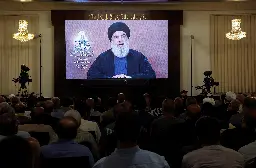
Hezbollah has been trading fire with Israel for more than eight months in parallel with the Gaza war. On Tuesday, the Iran-backed group published what it said was drone footage of sensitive military sites deep in Israeli territory.
In a televised address on Wednesday, Hezbollah chief Sayyed Hassan Nasrallah said "there will be no place safe from our missiles and our drones" in Israel in the event of a broader war.
The group also had "a bank of targets" that it could target in precision strikes, he said.
Israel "knows that what also awaits it in the Mediterranean is very big ... In the face of a battle of this magnitude, it knows that it must now wait for us on land, in the air, and at sea," Nasrallah added.
Israeli Foreign Minister Israel Katz had warned on Tuesday that a decision on an all-out war with Hezbollah was coming soon and Israel's military said "operational plans for an offensive in Lebanon were approved and validated".
Nasrallah also threatened Cyprus - the EU member state in closest proximity to Lebanon, with which it has cordial relations - accusing it of allowing Israel to use its airports and bases for military exercises.
- ‘I was shot in the leg back home’: the refugees reviving rural Spainwww.theguardian.com ‘I was shot in the leg back home’: the refugees reviving rural Spain
Depopulation can be a serious problem – ultimately, a shrinking community can’t maintain its services. But asylum seekers are bringing ghost villages back to life

- Chat control: Politicians, industry raise alarm over EU’s unprecedented messenger surveillance planswww.patrick-breyer.de Chat control: Politicians, industry raise alarm over EU’s unprecedented messenger surveillance plans
Tomorrow (Thursday) EU governments are to vote on a bill (officially called “child sexual abuse regulation” but known as “chat control”) that would require automated searches in and disclosure of private chats, including end-to-end encrypted chats, that might contain illegal photos or videos.[1] If

- EU rebukes France, Italy and others over excessive debtwww.dw.com EU rebukes France, Italy and others over excessive debt – DW – 06/19/2024
The EU has started disciplinary proceedings against seven member states, including France and Italy, over their accumulation of debt. Brussels had suspended debt regulations to help countries cope with COVID-19.
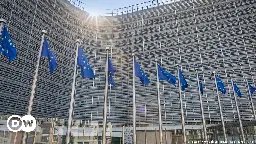
- Do any credit reporting agencies in Europe give consumers control over creditors access?
In the US, consumers can freeze their credit worthiness records and receive a code. When the records are frozen, the only orgs that can access the records are those already doing business with the consumer. If a consumer wants to open up a new account, they share the code with the prospective creditor who uses it to see the credit report.
So the question is, how are access controls on credit histories done in various EU nations? Do any use unlock codes like the US, or is it all trust based?
- The official slogan of the Hungarian Presidency of the Council of the European Union:

This is not a joke...
Transcript
Make Europe Great Again.🇪🇺 The official slogan of the Hungarian Presidency of the Council of the European Union. 🇭🇺🇪🇺 #HU24EU
https://x.com/HungaryintheEU/status/1803040970377773293
- China should pay for propping up Putin's war, Nato chief sayswww.bbc.com China should pay for propping Russia's Ukraine war - Nato chief
Jens Stoltenberg tells the BBC China should face "costs" for supporting Russia's war in Ukraine.
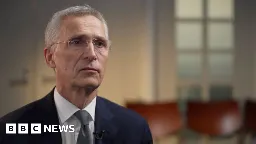
Here's Mr. Stoltenberg's statement in a video (1 min)
The head of Nato has told the BBC that China should face consequences for supporting Russia's war in Ukraine, if it does not change its ways.
Jens Stoltenberg said Beijing was "trying to get it both ways" by supporting Russia's war effort, while also trying to maintain relationships with European allies.
"This cannot work in the long run," Mr Stoltenberg told BBC News during a visit to Washington.
In the wide ranging interview, Mr Stoltenberg also addressed nuclear weapons and defence spending.
His comments come as Russia shows no sign of easing its war against Ukraine.
A peace summit held in Switzerland at the weekend saw dozens of nations commit to supporting Kyiv, but Russia called it a waste of time and said it would only agree to peace talks if Ukraine essentially surrendered.
When pressed on what Nato members might do about China's support of Russia, Mr Stoltenberg said there was an "ongoing conversation" about possible sanctions.
He said China was "sharing a lot of technologies, [like] micro-electronics, which are key for Russia to build missiles, weapons they use against Ukraine".
He added that "at some stage, we should consider some kind of economic cost if China doesn't change their behaviour".
Beijing is already under some sanctions for its support of Russia - last month, the US announced restrictions that would target about 20 firms based in China and Hong Kong.
China has defended its business with Moscow, saying it is not selling lethal arms and "prudently handles the export of dual-use items in accordance with laws and regulations".
Mr Stoltenberg's visit to Washington came as the Kremlin confirmed that Vladimir Putin will travel to North Korea on Tuesday.
It follows his visit to China last month.
Russia has become increasingly isolated on the world stage since it launched its full-scale war with Ukraine in 2022. Mr Putin has repeatedly said that the West's balance of power is shifting, and he has worked to strengthen ties with like-minded leaders.
"Russia right now is aligning more and more with authoritarian leaders," Mr Stoltenberg told the BBC, listing Iran, Beijing and North Korea.
He said that the North has sent artillery shells to Russia, and in return Russia had given advanced technology for North Korea's missile and nuclear programmes.
"So North Korea is helping Russia to conduct a war of aggression against Ukraine."
Speaking ahead of a meeting with US President Joe Biden, the Nato chief also announced that more than 20 nations are expected to meet a defence spending target of 2% this year - more than any other year since it was pledged in 2014.
"This is good for Europe and good for America, especially since much of this extra money is spent here in the United States," he said.
Mr Stoltenberg also addressed comments that he made to the Telegraph on Sunday which indicated that Nato may be considering increasing the number of deployable warheads as a deterrent against growing threats from Russia and China.
The comments were criticised as "nothing but another escalation of tension" by Kremlin spokesman Dmitry Peskov.
But Mr Stoltenberg said they were a "general message" that Nato is a nuclear alliance, and that any attack on a Nato member will "trigger a response from the whole alliance".
"The purpose of Nato is not to fight the war, the purpose of that is to prevent the war," he said.
- Rogue Austrian minister burns bridges to save EU nature lawwww.politico.eu Rogue Austrian minister burns bridges to save EU nature law
Cue the lawsuits, potential fines, dueling allegations — and, for Leonore Gewessler, a great campaign ad.

- Democracy at risk: media warfare and the role of technology in modern elections - Friends of Europe
"Professors at the European University Institute are warning of the rapid popularisation of generative-AI that makes threats of foreign interference and disinformation operations more subtle and harmful for our democracies than ever before. The number of violations reported just in Europe and only in 2024, also denounced by the Danish Broadcasting Corporation, depicts well-established tactics of media warfare from which the population needs to be protected."
- Swedish MPs green-light controversial US defense dealwww.lemonde.fr Swedish MPs green-light controversial US defense deal
The deal gives the US access to 17 military bases and training areas in Sweden.
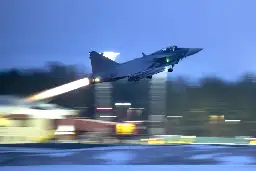
- Greek coastguard threw migrants overboard to their deaths, witnesses saywww.bbc.com Greek coastguard threw migrants overboard to their deaths, witnesses say
More than 40 people are alleged to have died as a result of Greek coastguard actions, BBC analysis reveals.
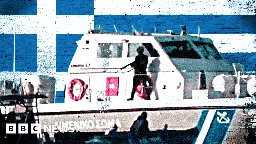
- China Is Targeting Europe's Soft (Pork) Belly
- In response to the EU's tariffs on EV, China announced an anti-dumping probe on pork imports from the European Union. But at less than $2 billion last year, pork accounts for a tiny sliver of the trade between the EU and China, which topped $280 billion in 2023.
- So why is China going after a sector that, economically, matters so little? Politics.
- Beijing is deploying a playbook it has used in previous trade skirmishes with Europe, the US and Australia. By targeting agriculture, the soft (pork) belly of Europe, China tries to keep the conflict contained and leverages the outsized influence of Europe’s farming lobby.
- Beijing obviously hopes that EU nations would now pressure Brussels into softening the EV tariffs before they’re officially imposed July 4. However, EU nations should avoid playing into China’s hands.--
Growing up in Spain, where the farming sector is a powerhouse, the wars I lived through were named for food: the “strawberry war” with the French in 1989, the “tuna war” with the British in 1990, and the “turbot war” with the Canadians in 1995. Still, nothing prepared me for what’s shaping up to be the “ham war” with China.
On Monday, Beijing announced an anti-dumping probe on pork imports from the European Union, a first step toward tariffs. The probe came less than a week after Brussels announced it would impose duties on Chinese-made electric vehicles as high as 50%, saying they benefited from “unfair subsidisation.”
Spain is, by far, the largest pork exporter into China, whose taste for the nation’s succulent (and expensive) Iberico ham has become increasingly fashionable. The Netherlands, Denmark, France, Belgium and Germany are also significant exporters.
But at less than $2 billion last year, pork accounts for a tiny sliver of the trade between the EU and China, which topped $280 billion in 2023. So why is China going after a sector that, economically, matters so little? Politics.
Beijing is deploying a playbook it has used in previous trade skirmishes with Europe, the US and Australia. By targeting agriculture, the soft (pork) belly of Europe, China achieves two objectives: It keeps the conflict contained and leverages the outsized influence of Europe’s farming lobby.
Beijing obviously hopes that EU nations would now pressure Brussels into softening the EV tariffs before they’re officially imposed July 4. Germany was already unhappy with the duties, fearing for its own car sales in China; Spain and France, which appeared undecided, could join Berlin against Brussels.
However, EU nations can avoid playing into China’s hands. Take Spain, where pork can make headlines in news bulletins and the quality of meat is a source of national pride. Last year, Spain exported €12.2 billion in meat, including not only pork, but also beef and poultry, to every nation in the world. But during the same period, its exports of automobiles, motorbikes and car components reached nearly €54 billion. It’s clear what sector matters the most economically.
Then, consider that Spain has no rival in China when it comes to high-end pork, but Spain and China are competing in the very same segment in the car industry: small, cheap cars for the growing ranks of the world’s working and middle classes. Spain has so far focused on gasoline- and diesel-powered cars, while the Chinese are leading on electric ones. Without tariff protection, it’s unlikely that Spain would be able to switch from gasoline into electric cars, and without that switch, its car industry would slowly die.
China has used the local farmers of its trade antagonist for its own benefit before: It pressured Australia by targeting its farm exports, including barley, beef, wine and lobsters, and it tried to force the hand of the US by restricting the soybean trade. The farming lobby is particularly strong in Brussels. After all, autoworkers don’t take their cars to the center of Brussels as farmers do with their tractors when they need to protest government policy.
China also knows that its imports of European pork, particularly of low-value-added meat, is going to decline as its pig herd grows again to meet local demand, which the Europeans also know and are braced for.
European nations should play their cards carefully. China has opened a window for negotiation. Its probe into European pork exports is likely to last six months, potentially a year, leaving plenty of time for talks. In that vein, its response to Brussels isn’t the start of a trade war, but rather the beginning of prewar talks. Both sides can find a solution.
Ultimately, Europe shouldn’t trade off its multibillion-euro car industry to content its politically active farmers. Agricultural exports are important, but they are more valuable for sentimental reasons than for economic impact. Put your mind in the euro value alone, however, and cars win – by a long mile. That should be the focus in Brussels, and in Madrid, Paris, Amsterdam and Copenhagen.
- Germany: Trial against 'Reichsbürger' group begins in Munichwww.dw.com Germany: Trial against 'Reichsbürger' group begins in Munich – DW – 06/18/2024
The trial against the "Reichsbürger" group, which allegedly planned to violently overthrow the German government, has begun in Munich. Alleged members are already on trial separately in Frankfurt and Stuttgart.

- EU passes law to restore 20% of bloc’s land and sea by end of decadewww.theguardian.com EU passes law to restore 20% of bloc’s land and sea by end of decade
Narrow vote causes fury in Vienna where climate minister is threatened with legal action by coalition partners
